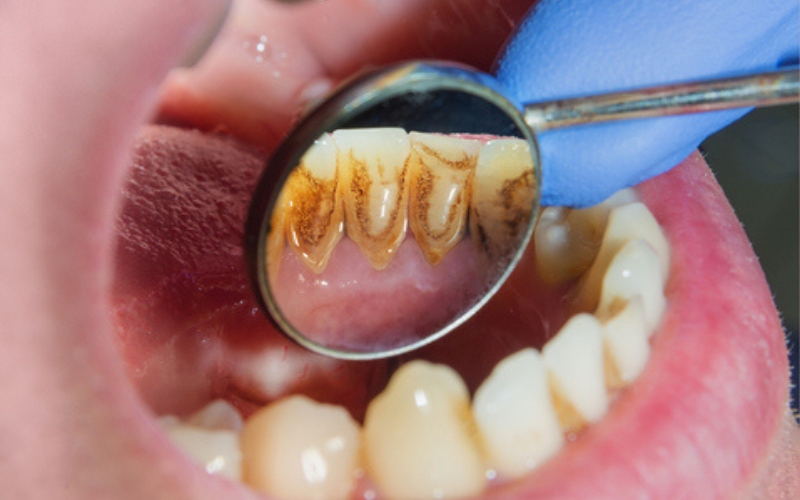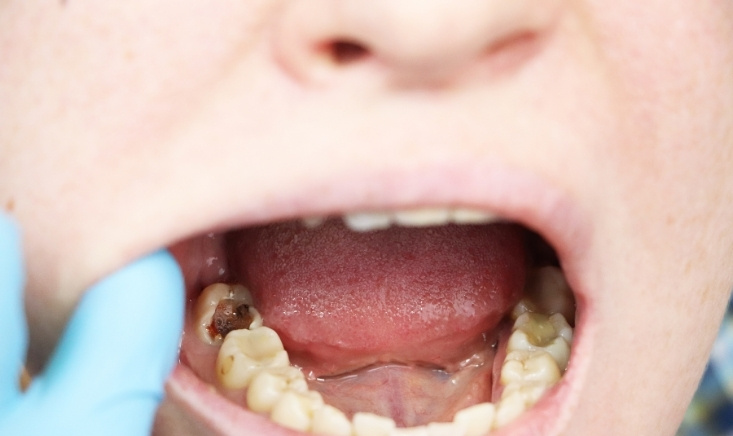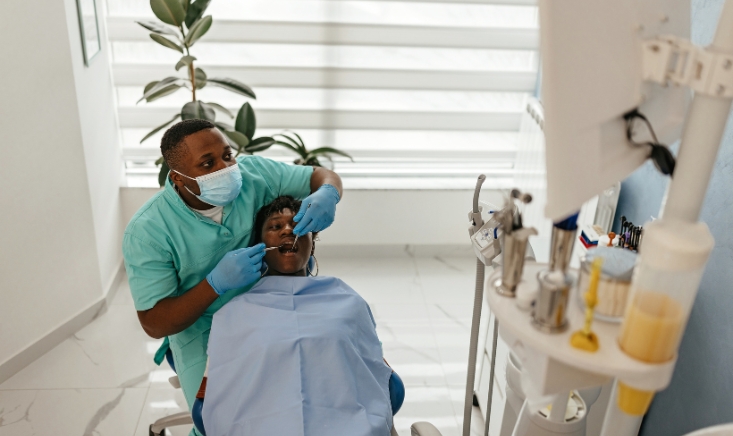2200 AW Grimes Blvd, Suite 100 Round Rock, TX 78665
7 Causes Of Black Spots On Teeth

Have you ever noticed dark spots on your teeth and wondered about their cause? Black spots on teeth can be more than just a cosmetic concern; they often indicate underlying issues. It is essential to comprehend the causes of these spots in order to preserve excellent dental health and stop additional damage.
This blog will explore seven common causes of black spots on teeth, from dental caries to the impact of certain medications. By identifying these causes, you can take proactive steps to address and prevent black spots, ensuring a healthier, brighter smile.
What Are the Major 7 Causes of Black Spots on Teeth?
1. Dental Caries (Cavities)
Dental caries, or cavities, arise from oral bacteria-producing acids that break down tooth enamel. This decay can lead to dark, black spots on the teeth.
Cavities may also cause tooth sensitivity and pain. You might notice a rough or discolored spot on the tooth surface.
Brush and floss frequently, see your dentist for exams, and use fluoride toothpaste twice a day to avoid cavities. Treatment often involves a filling to restore the tooth.
2. Tartar Buildup
Tartar, a hardened form of plaque, can form on teeth if plaque is not removed by regular brushing and flossing. It can appear as dark or black spots, especially near the gum line.
Tartar buildup is often rough and discolored. It may lead to gum irritation or bleeding.
Tartar accumulation can be avoided with routine brushing, flossing, and professional cleanings. Dentists use special tools to remove tartar during cleanings.
3. Staining from Foods and Beverages
Certain foods and drinks can stain teeth, leading to black or dark spots. Common culprits include coffee, tea, red wine, and berries.
Food that can cause discoloration include balsamic vinegar and soy sauce.
After consuming these foods, rinse your mouth with water to reduce discoloration and practice proper dental hygiene. Whitening treatments and dental cleanings can help remove stains.
4. Poor Oral Hygiene
Inadequate oral care allows plaque to build up, which can harden into tartar and create black spots on teeth.
Signs include bad breath, bleeding gums, and visible plaque or tartar.
Brush your teeth at least twice a day, floss daily, and use mouthwash. Maintaining oral health requires routine dental exams.
5. Dental Trauma
Dark stains can result from dental injuries like chips or cracks because they weaken the tooth enamel.
You might experience pain or sensitivity in addition to the black spots.
If you sustain a dental injury, see a dentist immediately. The tooth may need to have a crown or bonding applied in order to repair it and restore its appearance and functionality.
6. Fluorosis
Dental fluorosis occurs from excessive fluoride intake during tooth development, leading to white or brown spots that may darken over time.
Fluorosis typically results in discolored patches on teeth that can appear as black spots in severe cases.
Ensure fluoride use is within recommended limits, and discuss any concerns with your dentist. Treatments may include cosmetic procedures to improve appearance.
7. Medications and Medical Conditions
Certain medications, such as some antibiotics and medications for high blood pressure, can cause tooth discoloration. Medical conditions like certain cancers can also affect tooth color.
Tetracycline antibiotics are known to cause staining in developing teeth.
If you suspect medication or a medical condition is affecting your teeth, consult with your healthcare provider. Treatment may involve alternative medications or dental whitening options.
How to Identify Black Spots on Teeth?
Visual Indicators: Black spots on teeth can range from small dots to larger patches. They are often dark brown or black and can be found on the surface or between teeth. Unlike cavities, they might not be accompanied by holes or pits.
Associated Symptoms: While some black spots may not cause pain, they can be a sign of other issues. Watch for symptoms like tooth sensitivity, bad breath, or bleeding gums. If the black spots are persistent or worsening, it’s crucial to see a dentist.
The Impact of Black Spots on Oral Health
Potential Complications: Black spots on teeth can signal underlying issues like cavities or tartar buildup. These problems can result in gum disease, dental decay, or even tooth loss if they are not treated. It is essential to address the cause to avoid more severe health problems.
Impact on Aesthetics: Beyond health concerns, black spots can affect your smile and self-esteem. They can be noticeable and may cause embarrassment, impacting social interactions and confidence. Addressing the cosmetic aspect is often as important as treating the health issues.
Preventive Measures for Healthy Teeth
Daily Dental Routine: Use fluoride toothpaste twice a day to brush your teeth, and floss at least once a day. To freshen your breath and lessen plaque buildup, use an antibacterial mouthwash. Preventing black spots requires consistent brushing and flossing.
Diet and Lifestyle: Avoid excessive consumption of staining foods and beverages like coffee and red wine. Maintain a balanced diet rich in fruits and vegetables, which help protect enamel. Regular dental checkups are essential for preventing and addressing issues before they become severe.
In summary, black spots on teeth can arise from various causes, including cavities, tartar buildup, and staining from foods and beverages. Proper oral hygiene and regular dental visits are key to preventing these issues. If you notice black spots or experience related symptoms, it is important to consult a dentist for a thorough examination and appropriate treatment.




